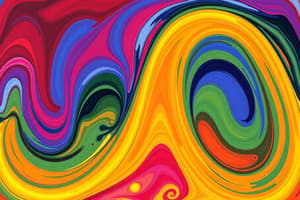Podcast
Questions and Answers
What does entropy most simply measure?
What does entropy most simply measure?
- The speed of particles
- The amount of heat in a system
- The volume of a closed container
- The measure of disorder (correct)
In relation to the universe, what trend does entropy represent?
In relation to the universe, what trend does entropy represent?
- Constant energy levels
- A trend toward chaos and disorder (correct)
- Increased organization over time
- Decreasing molecular motion
What does the entropy of a closed system do over time?
What does the entropy of a closed system do over time?
- It decreases as particles settle
- It only increases over time (correct)
- It remains constant
- It can fluctuate up and down
How is entropy related to the molecular movement in a system?
How is entropy related to the molecular movement in a system?
What is the role of entropy in information technology?
What is the role of entropy in information technology?
In the context of guessing a random letter, what does entropy represent?
In the context of guessing a random letter, what does entropy represent?
What aspect does entropy indicate when discussing randomness?
What aspect does entropy indicate when discussing randomness?
Why is a high entropy state considered less organized?
Why is a high entropy state considered less organized?
Flashcards
Entropy
Entropy
The measure of disorder within a system. The more disordered a system is, the higher its entropy.
Entropy (Thermodynamics)
Entropy (Thermodynamics)
In thermodynamics, entropy is a measure of how quickly particles within an object are moving. The faster the particles move, the higher the entropy.
Entropy (Information Theory)
Entropy (Information Theory)
A measure of randomness or uncertainty within a system. The more predictable a system is, the lower its entropy.
Information Entropy
Information Entropy
Signup and view all the flashcards
Entropy in Information Technology
Entropy in Information Technology
Signup and view all the flashcards
Second Law of Thermodynamics
Second Law of Thermodynamics
Signup and view all the flashcards
Information Storage
Information Storage
Signup and view all the flashcards
Information Content
Information Content
Signup and view all the flashcards
Study Notes
Entropy in Thermodynamics
- Entropy is a measure of molecular disorder or randomness in a system
- Entropy is a measure of how quickly particles inside an object are moving
- Low entropy corresponds to highly ordered arrangements, while high entropy represents highly disordered arrangements. Examples include ice, water, and a cloud.
- Entropy increases during processes like melting and vaporization, where particles gain more freedom to move.
Entropy in Information
- Entropy is the expected value of the information contained in a message
- Entropy is a measure of randomness
- A higher entropy corresponds to a greater uncertainty about an outcome.
- A lower entropy corresponds to a smaller uncertainty about an outcome.
Defining Entropy
- Entropy in information theory is calculated using the following formula: H = -∑ p(x) log₂ p(x)
- Where:
- H represents entropy
- p(x) represents the probability of an event x
- This formula represents the expected value of the information content, or the expected amount of surprise or uncertainty associated with the different outcomes.
Information Technology Applications (Formula Examples)
- The formula for entropy in information theory is used to measure the amount of information contained within a message.
- An example relates to choices (e.g., letters in a sequence).
- Entropy is used to measure message space, using the number of possible outcomes.
- The number of bits required to store a message reflects its entropy.
- The number of yes/no questions to distinguish among possible outcomes reflects message entropy.
- Entropy values for examples shown reflect the randomness of letter choices.
Additional Calculations and Concepts
- A bit (binary digit) is the basic unit of information.
- A coin flip (heads or tails) is a 1 bit example.
- The number of yes/no questions needed to identify something represents its information content.
- The number of yes/no questions needed to uniquely specify an item (e.g. a letter from a set) is related to the information content (entropy).
Studying That Suits You
Use AI to generate personalized quizzes and flashcards to suit your learning preferences.
Related Documents
Description
This quiz explores the concept of entropy in both thermodynamics and information theory. Learn how entropy relates to the randomness and disorder in physical systems and information messages. Test your understanding of the principles and formulas that define entropy in different contexts.




